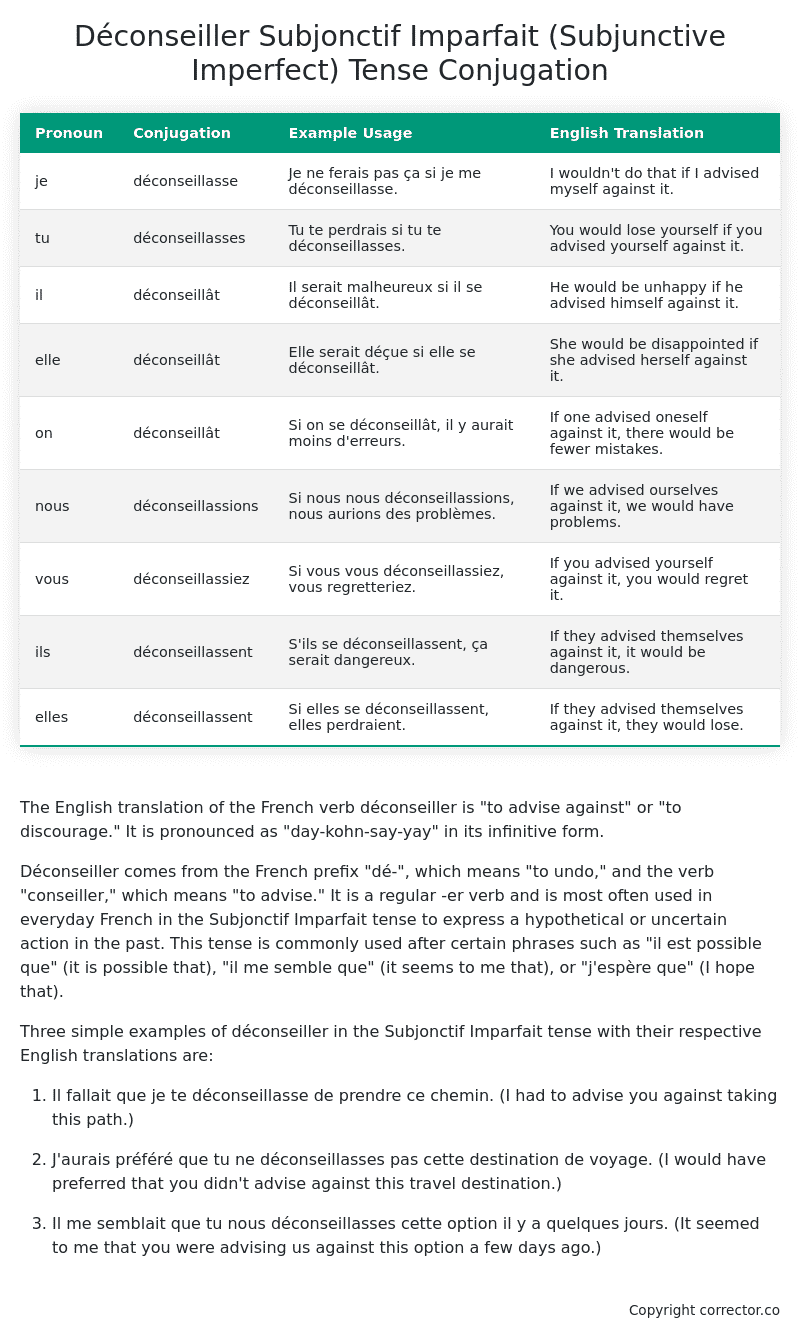Subjonctif Imparfait (Subjunctive Imperfect) Tense Conjugation of the French Verb déconseiller
Introduction to the verb déconseiller
The English translation of the French verb déconseiller is “to advise against” or “to discourage.” It is pronounced as “day-kohn-say-yay” in its infinitive form.
Déconseiller comes from the French prefix “dé-“, which means “to undo,” and the verb “conseiller,” which means “to advise.” It is a regular -er verb and is most often used in everyday French in the Subjonctif Imparfait tense to express a hypothetical or uncertain action in the past. This tense is commonly used after certain phrases such as “il est possible que” (it is possible that), “il me semble que” (it seems to me that), or “j’espère que” (I hope that).
Three simple examples of déconseiller in the Subjonctif Imparfait tense with their respective English translations are:
-
Il fallait que je te déconseillasse de prendre ce chemin. (I had to advise you against taking this path.)
-
J’aurais préféré que tu ne déconseillasses pas cette destination de voyage. (I would have preferred that you didn’t advise against this travel destination.)
-
Il me semblait que tu nous déconseillasses cette option il y a quelques jours. (It seemed to me that you were advising us against this option a few days ago.)
Table of the Subjonctif Imparfait (Subjunctive Imperfect) Tense Conjugation of déconseiller
| Pronoun | Conjugation | Example Usage | English Translation |
|---|---|---|---|
| je | déconseillasse | Je ne ferais pas ça si je me déconseillasse. | I wouldn’t do that if I advised myself against it. |
| tu | déconseillasses | Tu te perdrais si tu te déconseillasses. | You would lose yourself if you advised yourself against it. |
| il | déconseillât | Il serait malheureux si il se déconseillât. | He would be unhappy if he advised himself against it. |
| elle | déconseillât | Elle serait déçue si elle se déconseillât. | She would be disappointed if she advised herself against it. |
| on | déconseillât | Si on se déconseillât, il y aurait moins d’erreurs. | If one advised oneself against it, there would be fewer mistakes. |
| nous | déconseillassions | Si nous nous déconseillassions, nous aurions des problèmes. | If we advised ourselves against it, we would have problems. |
| vous | déconseillassiez | Si vous vous déconseillassiez, vous regretteriez. | If you advised yourself against it, you would regret it. |
| ils | déconseillassent | S’ils se déconseillassent, ça serait dangereux. | If they advised themselves against it, it would be dangerous. |
| elles | déconseillassent | Si elles se déconseillassent, elles perdraient. | If they advised themselves against it, they would lose. |
Other Conjugations for Déconseiller.
Le Present (Present Tense) Conjugation of the French Verb déconseiller
Imparfait (Imperfect) Tense Conjugation of the French Verb déconseiller
Passé Simple (Simple Past) Tense Conjugation of the French Verb déconseiller
Passé Composé (Present Perfect) Tense Conjugation of the French Verb déconseiller
Futur Simple (Simple Future) Tense Conjugation of the French Verb déconseiller
Futur Proche (Near Future) Tense Conjugation of the French Verb déconseiller
Plus-que-parfait (Pluperfect) Tense Conjugation of the French Verb déconseiller
Passé Antérieur (Past Anterior) Tense Conjugation of the French Verb déconseiller
Futur Antérieur (Future Anterior) Tense Conjugation of the French Verb déconseiller
Subjonctif Présent (Subjunctive Present) Tense Conjugation of the French Verb déconseiller
Subjonctif Passé (Subjunctive Past) Tense Conjugation of the French Verb déconseiller
Subjonctif Imparfait (Subjunctive Imperfect) Tense Conjugation of the French Verb déconseiller (this article)
Conditionnel Présent (Conditional Present) Tense Conjugation of the French Verb déconseiller
Conditionnel Passé (Conditional Past) Tense Conjugation of the French Verb déconseiller
L’impératif Présent (Imperative Present) Tense Conjugation of the French Verb déconseiller
L’infinitif Présent (Infinitive Present) Tense Conjugation of the French Verb déconseiller
Struggling with French verbs or the language in general? Why not use our free French Grammar Checker – no registration required!
Get a FREE Download Study Sheet of this Conjugation 🔥
Simply right click the image below, click “save image” and get your free reference for the déconseiller Subjonctif Imparfait tense conjugation!

Déconseiller – About the French Subjonctif Imparfait (Subjunctive Imperfect) Tense
Formation
Common Everyday Usage Patterns
Interactions with Other Tenses
Subjonctif Présent
Indicatif Passé Composé
Conditional
Conditional Perfect
Summary
I hope you enjoyed this article on the verb déconseiller. Still in a learning mood? Check out another TOTALLY random French verb conjugation!


